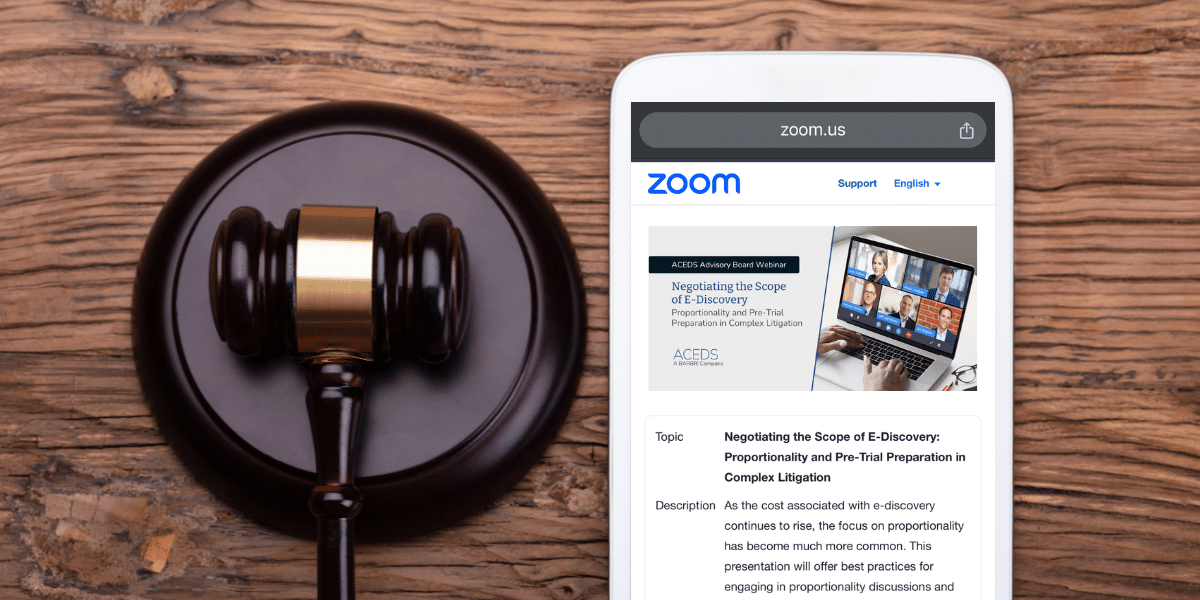I was fortunate to moderate a webinar for ACEDS about proportionality and summarize the discussion below. You can listen to the entire program here.
Proportionality in e-discovery is based on the objective of Rule 1 of the Federal Rules of Civil Procedure, which is to ensure a “just, speedy, and inexpensive” resolution of cases. It is designed to prevent unnecessarily burdensome and costly discovery requests. Although a single factor does not determine proportionality, it is typically based on balancing the importance of the information requested with the cost and time required to retrieve it. Ultimately, proportionality is the equilibrium between thoroughness and efficiency.
Ensuring Proportionality in E-Discovery
To persuade a judge that a particular discovery request is expensive, inefficient, or unnecessary, legal teams must understand and quantify the cost and effort required and propose viable alternatives to demonstrate their genuine commitment to a full and fair discovery process. “When you go into this, you’ve got to have your facts lined up, you need to know why something is so expensive, and have explored ways to make it cheaper; I very rarely run across judges that won’t listen to you when you can do all of those things,” said Jeff Jacobson, a partner with Faegre Drinker.
Recognizing the Role of Information Governance
Information governance ensures a more organized approach to data management, allowing teams to classify, prioritize, and store information effectively, making it easier to identify relevant documents quickly. “Keeping data volumes low and knowing what kinds of data you have can make this process easier,” advised Amy Sellars, E-Discovery Counsel at Gunster.
Sampling techniques can also be influential in demonstrating the burden of an overly broad e-discovery request. “Sampling can be one of the most powerful tools in defending burdensome requests,” noted Al Lindsay, a partner with Hogan Lovells. By retrieving a manageable subset of data and analyzing it for relevance, attorneys can argue that extending the review further would result in diminishing returns. Not only does this save time and money, but it also strengthens the case for limiting data review to what is necessary.
Documenting and Communicating Proportionality
Effective e-discovery in complex litigation hinges on a well-documented record supporting proportionality. Each step, decision, and compromise must be thoroughly recorded to create a clear, defendable record of why specific parameters were set. This documentation becomes critical if issues arise later in the discovery process. Communicating the boundaries of e-discovery to all parties involved—including clients, opposing counsel, and judges—also ensures that expectations are aligned. Clear, consistent communication helps prevent misunderstandings and establishes a framework for making adjustments as the case evolves. “If you don’t know where you’re going, any road will take you somewhere, but you might not be happy with where you end up,” said George Socha, the Senior Vice President of Brand Awareness at Reveal.
Managing Costs and Reducing Burnout
Cost management is a significant aspect of proportionality, and by reducing the scope of data review, teams can save considerable sums. However, e-discovery is a demanding process that often leads to burnout, mainly if tasks are inefficiently managed. “It is important to address human ethics in e-discovery work, as burnout is a real danger, often self-inflicted,” Sellars emphasized. “Having a conversation at the start about reasonable timelines can reduce the impact of unreasonable deadlines,” she added.
Being considerate of the human effort required and avoiding unnecessary duplication or exhaustive data reviews can also prevent burnout among legal professionals. Keeping the laws of arithmetic in mind—meaning staying realistic about time and resource limitations—allows teams to work more effectively and reduces the risk of errors or missed deadlines.
Navigating International and Cross-Border E-Discovery
The proportionality rules remain consistent across domestic cases, but international clients and cross-border litigation introduce additional challenges. Data privacy laws, data transfer restrictions, and compliance regulations vary significantly by country, posing potential pitfalls for the unwary. Being aware of these nuances is crucial when crafting proportionality arguments in a global context. Legal teams must navigate these additional considerations carefully, understanding both the client’s and the foreign jurisdiction’s expectations to ensure compliance and avoid costly delays or sanctions. That said, “The rules don’t change just because your client is international,” said Lindsay.
Conclusion
In the complex e-discovery landscape, proportionality is a guiding principle that balances thoroughness with practicality. “The more you can understand the data you have early on, the better placed you are to make decisions concerning it,” noted Socha.
By implementing strategic approaches to information governance, sampling, documentation, and clear communication, litigation teams can establish a reasonable scope for e-discovery and ensure their efforts are effective and sustainable. “If you have the desire to roll up your sleeves and figure out why things work the way they do, you can save your clients money and be hugely successful, not just in client service, but also in explaining issues to judges in ways that will help your clients win the case,” encouraged Jacobson.

